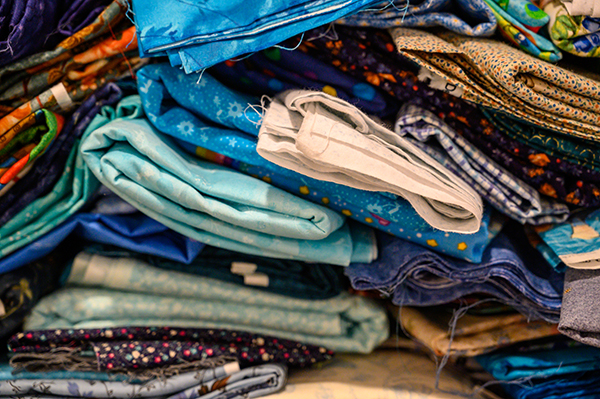Bangladesh garment factory owners demand fashion retailers help shoulder costs amid economic slowdown and mandated wage hike
11/14/2023 / By Arsenio Toledo

Owners of clothing factories in global fashion manufacturing hub Bangladesh are asking major clients to help them pay for a 56 percent government-mandated hike in wages for garment factory workers.
The wage increase of 56 percent is the first notable wage increase for the industry’s workers in five years and raises wages to 12,500 Bangladeshi takas a month ($113) beginning on Dec. 1. (Related: Dark side of glam: Models expose sexual harassment, dangerous working conditions in fashion industry.)
This wage increase was agreed upon by a panel of factory owners, garment factory union leaders and government officials after the government turned down the initial proposal of factory owners of an increase to 10,400 takas a month ($94).
Siddiqur Rahman, a representative of the factory owners’ association, the Bangladesh Garment Manufacturers and Exporters Association, noted during the talks that the massive wage hike could be a “disaster” for the garment manufacturing industry, which accounts for almost 16 percent of the gross domestic product of Bangladesh and generates more than $40 billion a year in export receipts for the country.
Bangladesh is home to more than 4,000 factories that are critical to supplying global brands with clothes. But fashion retailers are grappling with high inventories and lessening consumer demand amid a slowing global economy, leading to a 14 percent drop in Dhaka’s garment exports last month.
“The timing is not good,” said Fazlul Hoque, managing director of the garment manufacturing factory Plummy Fashions. “The industry is already struggling, order flow is slow, energy supply is not adequate and the overall economic situation is not good. In such a time, a big hike in wages certainly will be tough.”
Hoque warned that the increase would add between five to six percent to overall costs, a rise he and other factory owners are unable to bear and have therefore asked their clients to help shoulder by agreeing to higher rates.
Wage hike insufficient, claim striking garment workers
Stagnant wages helped the world’s major fashion companies to choose the country as its manufacturer of garments, making Dhaka the largest garment exporter after China. But soaring fuel and power prices and massive inflation have added to the spiraling cost of living crisis for people in the country, leading to massive discontent in the industry.
Worse yet for factory workers and fashion brands that rely on Bangladesh is the fact that leading garment factory workers’ unions in the country are not satisfied by the 56 percent pay increase and have taken to the streets in strikes and impromptu walkouts.
“We wanted a minimum wage of 23,000 takas [$208] a month,” said Kalpona Akter, president of the Bangladesh Garment and Industrial Workers Federation. She added that laborers were disheartened to see that the government accepted the initial wage hike offer of factory owners without considering the demands of garment factory workers.
“Considering the rising food prices and inflation, even [23,000 takas] is very small for workers and their families,” said Akter. “With the declared minimum wage of 12,500 takas, it will not be possible for the workers to survive.”
Bangladesh employs more than four million workers in the garment manufacturing industry. Of the more than 4,000 factories in the country, at least 130 have already been forced to shut down because of worker walkouts.
Factory owners have responded by suspending operations, citing a labor law that allows them to close factories due to “illegal strikes,” with a total of 78 factories employing over 300,000 workers suspending operations for an indefinite period. The government has also deployed the police to the streets of Dhaka to respond with brute force to suppress demonstrations.
At least four workers have already been killed by the heavy-handed police response, while over 11,000 more garment workers have been charged over allegations of violence and vandalism.
Learn more about wage issues and disputes all over the world at EconomicRiot.com.
Watch this clip from Dhaka featuring striking garment factory workers being forcibly dispersed by police.
This video is from the Cynthia’s Pursuit of Truth channel on Brighteon.com.
More related stories:
Career socialist activist “pulling strings” on UAW strike, costing economy $7.7bn and 6,000 jobs.
Several L.A. hotels under investigation for hiring ILLEGALS to replace striking workers.
3,700 Detroit casino workers launch strike for better pay and improved working conditions.
Fashion company creating clothing line that shields people from A.I. facial recognition technology.
Sources include:
Submit a correction >>
Tagged Under:
Bangladesh, bubble, chaos, debt bomb, debt collapse, economic collapse, economics, economy, factory workers, fashion industry, financial crash, freedom, garments, inflation, Liberty, market crash, minimum wage, money supply, panic, revolt, risk, strikes, uprising, wages
This article may contain statements that reflect the opinion of the author
RECENT NEWS & ARTICLES
COPYRIGHT © 2017 UPRISING NEWS



















